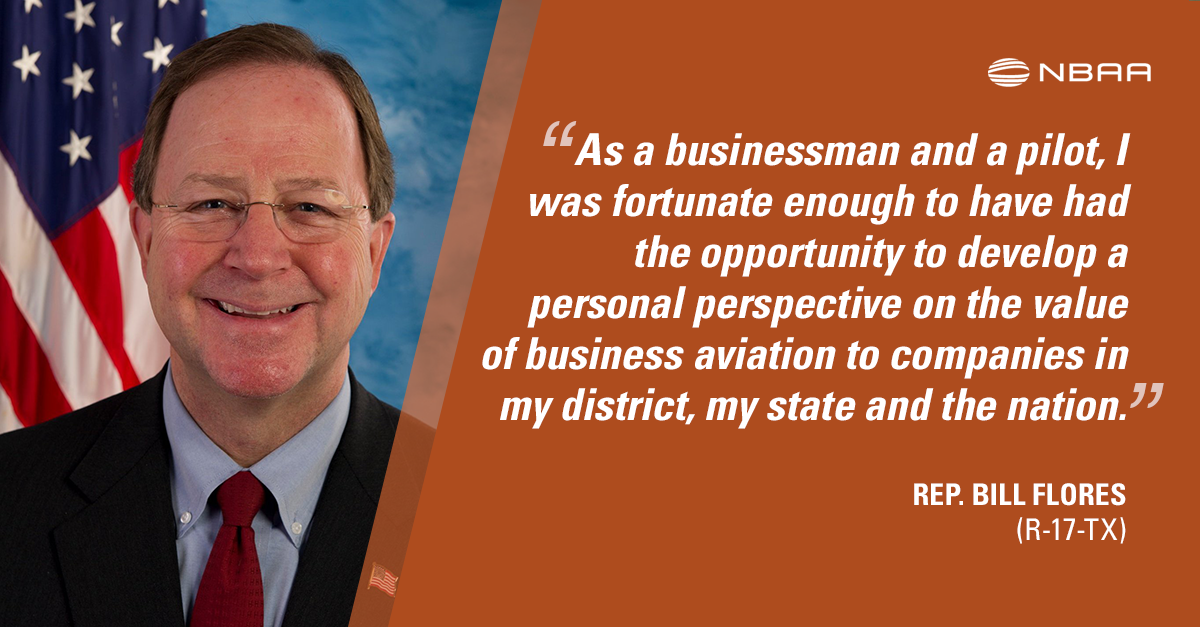
June 27, 2016
REP. BILL FLORES has served since 2010 the 17th congressional district of Texas, which covers portions of Central Texas from Waco to College Station to North Austin. In the 114th Congress, Flores, a member of the House General Aviation Caucus, was elected by his fellow conservative colleagues to chair the Republican Study Committee, an influential caucus in the House committed to economic opportunity, national security, fiscal responsibility, American values and limited government. He also serves on the House Energy and Commerce Committee. He is an instrument-rated private pilot with more than 2,500 hours of pilot-in-command time. Before he entered public service, this ninth-generation Texan worked for many years in the energy industry, serving as president and CEO of Phoenix Exploration Co. in Houston.

Q. How important is general aviation in your district?
A. As a businessman and a pilot with over 2,000 hours in my logbook, I was fortunate enough to develop a personal perspective on the value of business aviation in our congressional district, my home state of Texas and the nation as a whole. Business aviation is a business enabler, giving companies the freedom to compete successfully, reaching customers wherever they are located and sometimes even enabling business to be conducted while enroute. Business aviation also is an economic multiplier, generating thousands of jobs for Texans and bolstering our regional and national economies.
Q. Can you provide an example of recent congressional legislative action that has benefited business aviation?
A. Last December Congress passed legislation to extend certain tax provisions as part of the annual federal funding process. The extension of these provisions that benefit small businesses included bonus depreciation for companies making capital investments in aircraft.
Q. Congress is considering privatizing the ATC system as part of the FAA reauthorization process. What are your views on this?
A. In January, I attended a town hall meeting of general aviation leaders in Washington, DC to discuss recent proposals to privatize our nation’s ATC system. These discussions made it clear that the general aviation community (of which I am a member) is against privatization, and they reinforced my opinion that we need to consider other options to deal with modernizing our ATC system. Our nation’s airspace is a resource of significant importance to our security, economy and citizens. Our airspace is, by far, the busiest in the world, and it includes a general aviation component that is not matched in any other region of the world. In addition, our military also is a significant user of this multifaceted national asset. In light of the foregoing, any changes to our ATC system will need to reflect (1) the significance of this resource to our nation and (2) the diversity of its users. Thus, in my opinion, Congress should never cede control of our nation’s airspace to any other entity, and Congress should continue to maintain significant oversight regarding the funding of our ATC system and the revenues generated to fund it.
As a businessman and a pilot, I was fortunate enough to have had the opportunity to develop a personal perspective on the value of business aviation to companies in my district, my state and the nation.
Q. Why have you supported reforms to the third-class medical requirements for general aviation pilots?
A. As one who has long fought for less-intrusive government regulation, I support the Pilots’ Bill of Rights, which has expanded legal protections for general aviation pilots. That said, there is more work to be done on this issue, and I am one of dozens of co-sponsors of the General Aviation Pilot Protection Act of 2015, which would allow general aviation pilots in certain instances to use a valid driver’s license in lieu of an FAA medical certificate. Under the proposed legislation, pilots who make noncommercial VFR flights in aircraft weighing up to 6,000 pounds and having no more than six seats would be exempt from the third-class medical certification requirement. These pilots would be limited to carrying a maximum of five passengers, flying at altitudes below 14,000 feet, and at speeds no faster than 250 knots. This is a reasonable and much-needed reform that would not compromise safety and would enable the FAA to redirect its limited resources to higher-priority projects.


 International Business Aviation Council Ltd.
International Business Aviation Council Ltd.